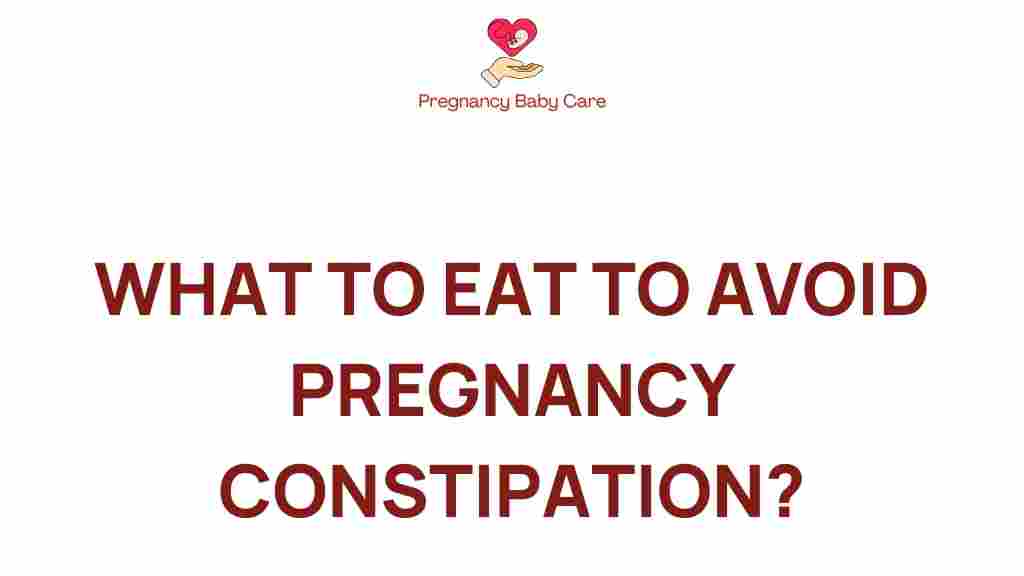Unlocking Digestive Ease: What to Eat to Avoid Pregnancy Constipation
Pregnancy is a beautiful journey filled with anticipation, but it can also come with its fair share of discomforts, one of which is pregnancy constipation. As your body undergoes significant changes, maintaining digestive health is crucial for both you and your growing baby. In this article, we will explore the best dietary practices to alleviate constipation during pregnancy, focusing on nutrition, hydration, and fiber-rich foods that support wellness for expectant mothers.
Understanding Pregnancy Constipation
Constipation during pregnancy is a common issue, affecting many expectant mothers. Hormonal changes, particularly the increase in progesterone, can slow down the digestive system. Additionally, the growing uterus can put pressure on the intestines, further contributing to this discomfort. Recognizing the importance of diet in managing pregnancy constipation is key to ensuring a smoother experience.
Key Nutritional Strategies to Combat Pregnancy Constipation
The right diet can make a significant difference in managing pregnancy constipation. Here are some essential strategies to consider:
1. Increase Fiber Intake
Fiber is a vital component of a healthy diet, especially during pregnancy. It adds bulk to your stool and helps it move through the intestines. Aim for a mix of soluble and insoluble fiber. Here are some fiber-rich foods to include:
- Fruits: Apples, berries, pears, oranges, and bananas are excellent choices.
- Vegetables: Broccoli, carrots, spinach, and sweet potatoes can boost fiber intake.
- Whole Grains: Opt for whole grain bread, brown rice, quinoa, and oats.
- Legumes: Beans, lentils, and chickpeas are not only high in fiber but also packed with protein.
Incorporating these fiber-rich foods into your meals can help promote regular bowel movements and ease constipation.
2. Stay Hydrated
Hydration plays a crucial role in digestive health. Drinking enough water can help soften your stool and make it easier to pass. Here are some tips for staying hydrated:
- Drink at least 8-10 glasses of water daily.
- Incorporate hydrating foods such as cucumbers, watermelon, and oranges into your diet.
- Avoid excessive caffeine and sugary drinks, which can dehydrate you.
Proper hydration is essential for preventing pregnancy constipation and maintaining overall health during this critical time.
3. Regular Meal Timing
Eating at regular intervals can help regulate your digestive system. Instead of three large meals, consider having smaller, more frequent meals throughout the day. This practice can aid digestion and prevent constipation.
4. Consider Probiotics
Probiotics are beneficial bacteria that can improve gut health and digestion. Including probiotic-rich foods in your diet can support a healthy digestive system. Some great sources of probiotics include:
- Yogurt with live cultures
- Kefir
- Sauerkraut
- Kombucha
Adding these foods to your diet can enhance your digestive health and help combat pregnancy constipation.
Step-by-Step Process for Managing Pregnancy Constipation
To effectively manage pregnancy constipation, follow this step-by-step process:
Step 1: Plan Your Meals
Start by creating a weekly meal plan that incorporates a variety of fiber-rich foods, fruits, vegetables, and whole grains. Consider the following:
- Include at least one serving of fruit and one serving of vegetables in every meal.
- Choose whole grain options instead of refined grains.
- Snack on nuts, seeds, and dried fruits for added fiber.
Step 2: Monitor Your Fluid Intake
Keep track of your daily water intake. Set reminders if necessary to ensure you drink enough throughout the day. Remember, hydration is key to preventing pregnancy constipation.
Step 3: Stay Active
Regular physical activity can stimulate digestion and help prevent constipation. Consider low-impact exercises suitable for pregnancy, such as:
- Walking
- Swimming
- Yoga
Consult your healthcare provider before starting any new exercise regimen during pregnancy.
Step 4: Limit Constipating Foods
Be mindful of foods that can contribute to constipation. Limit or avoid:
- Processed foods low in fiber
- Excessive dairy products
- Red meat
Focusing on whole, nutrient-dense foods will support your digestive health and help alleviate pregnancy constipation.
Troubleshooting Tips for Constipation During Pregnancy
If you’re still experiencing pregnancy constipation despite implementing dietary changes, here are some troubleshooting tips:
1. Increase Physical Activity
Sometimes, increasing your level of physical activity can help stimulate your digestive system. Try to incorporate more movement into your daily routine.
2. Consider Natural Laxatives
Some natural options can help relieve constipation, such as:
- Psyllium husk: A soluble fiber that can be taken with plenty of water.
- Flaxseeds: Ground flaxseeds can be added to smoothies or oatmeal.
Always consult your healthcare provider before trying supplements or laxatives during pregnancy.
3. Consult a Healthcare Provider
If constipation persists, it’s important to speak with your healthcare provider. They can provide additional guidance and ensure there are no underlying health concerns.
Conclusion
Managing pregnancy constipation is essential for maintaining comfort and overall health during this important time. By focusing on a balanced diet rich in fiber, staying hydrated, and keeping active, expectant mothers can significantly reduce the risk of constipation and promote better digestive health.
Remember, every pregnancy is unique, and what works for one individual may not work for another. It’s important to listen to your body and consult with a healthcare professional as needed. For more information on prenatal care and nutrition, check out this resource that provides detailed guidance on maintaining wellness during pregnancy.
By taking proactive steps towards a healthy diet and lifestyle, you can unlock digestive ease and enjoy a more comfortable pregnancy journey.
This article is in the category Pregnancy and created by PregnancyBabyCare Team
